Illinois Representatives’ Votes in Congress
Chronicle Media — January 9, 2017House of Representatives
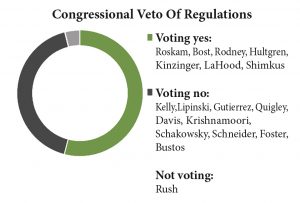 Congressional Veto Of Regulations: Voting 237 for and 187 against, the House on Jan. 5 passed a GOP-drafted bill (HR 26) that would prevent major rules issued by the executive branch from taking effect unless they receive – in advance — votes of approval from both chambers of Congress. This would reverse present law, under which Congress can disapprove of (kill) new regulations only after they are in place. The bill covers rules having at least a $100 million impact on the economy. Under the separation of powers doctrine, Congress is entrusted to write laws and the executive branch to implement them, usually through a rulemaking process that invites comments from stakeholders and the general public.
Congressional Veto Of Regulations: Voting 237 for and 187 against, the House on Jan. 5 passed a GOP-drafted bill (HR 26) that would prevent major rules issued by the executive branch from taking effect unless they receive – in advance — votes of approval from both chambers of Congress. This would reverse present law, under which Congress can disapprove of (kill) new regulations only after they are in place. The bill covers rules having at least a $100 million impact on the economy. Under the separation of powers doctrine, Congress is entrusted to write laws and the executive branch to implement them, usually through a rulemaking process that invites comments from stakeholders and the general public.
Bob Goodlatte, R-Va., said the bill does not prohibit new regulations but “simply establishes the principle: No major regulation without representation. ”
Hank Johnson, D-Ga., called the bill “an unmitigated disaster for public health and safety.”
A yes vote was to send the bill to the Senate, where it could face a Democratic filibuster.
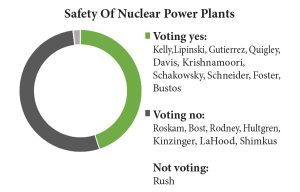 Safety Of Nuclear Power Plants: Voting 194 for and 231 against, the House on Jan. 5 defeated a Democratic-sponsored amendment that sought to exempt from HR 26 (above) any new regulations for ensuring the safety of nuclear reactors and nuclear power plants operating in the U.S.
Safety Of Nuclear Power Plants: Voting 194 for and 231 against, the House on Jan. 5 defeated a Democratic-sponsored amendment that sought to exempt from HR 26 (above) any new regulations for ensuring the safety of nuclear reactors and nuclear power plants operating in the U.S.
Jerrold Nadler, D-N.Y., said: members of Congress lack “the expertise or time to craft all technical regulations ourselves. We should defer to the engineers and scientists…who determine, after careful study, that a particular regulation is critical to our safety and to the safe operation of a nuclear power plant.”
Tom Marino, R-Pa., said the underlying bill “provides a powerful incentive for the agencies to write the best possible regulations. (It) makes Congress more accountable and ensures agencies will write better rules. All Americans will be safer for it.”
A yes vote was to exempt nuclear-safety regulations from the scope of the bill.
 Clean Air, Children’s Health: Voting 190 for and 233 against, the House on Jan. 5 refused to exempt from HR 26 (above) any regulation newly implemented under the Clean Air Act that would protect children against cancer, premature mortality, asthma attacks and respiratory diseases. Because the Clean Air Act is continually updated to reflect scientific advances, it would be subject to periodic congressional review and possible retrenchment under terms of the underlying bill.
Clean Air, Children’s Health: Voting 190 for and 233 against, the House on Jan. 5 refused to exempt from HR 26 (above) any regulation newly implemented under the Clean Air Act that would protect children against cancer, premature mortality, asthma attacks and respiratory diseases. Because the Clean Air Act is continually updated to reflect scientific advances, it would be subject to periodic congressional review and possible retrenchment under terms of the underlying bill.
Sponsor Kathy Castor, D-Fla., said her amendment was needed because “toxic pollutants, such as ozone, which is a major component of smog, are linked to asthma, lung and heart disease and result in thousands of (child) deaths every year and up to one million missed days of school.”
Tom Marino, R-Pa., said “do not be fooled. This amendment is not about reducing these maladies. It is about transferring the power to decide how best to do so from elected representatives to unaccountable bureaucrats.”
A yes vote backed an amendment pitting clean air for children against regulatory relief for businesses.
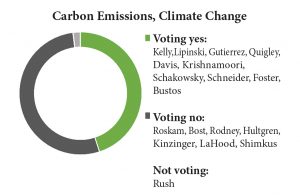 Carbon Emissions, Climate Change: Voting 193 for and 230 against, the House on Jan. 5 refused to amend HR 26 (above) to require advance congressional approval of any new regulation that would result in the discharge of at least 25,000 metric tons of carbon (or the equivalent) per year into the atmosphere. The amendment sought to require members to cast record votes on rules that worsen climate change..
Carbon Emissions, Climate Change: Voting 193 for and 230 against, the House on Jan. 5 refused to amend HR 26 (above) to require advance congressional approval of any new regulation that would result in the discharge of at least 25,000 metric tons of carbon (or the equivalent) per year into the atmosphere. The amendment sought to require members to cast record votes on rules that worsen climate change..
Sponsor Raul Grijalva, D-Ariz., said his amendment “acknowledges human-caused climate change and requires agencies…to report on how a rule impacts greenhouse gas emissions.”
Tom Marino, R-Pa., said the underlying bill “is not designed to address one or two subjects of regulation with heightened scrutiny but not others.”
A yes votes was to require record votes on rules that greatly increase carbon emissions.
 Lead Poisoning Of Drinking Water: Voting 192 for and 231 against, the House on Jan. 5 defeated an amendment that sought to exempt from HR 26 (above) any new federal regulations designed to protect drinking water in communities such as Flint, Mich., from lead contamination.
Lead Poisoning Of Drinking Water: Voting 192 for and 231 against, the House on Jan. 5 defeated an amendment that sought to exempt from HR 26 (above) any new federal regulations designed to protect drinking water in communities such as Flint, Mich., from lead contamination.
John Conyers, D-Mich., said members of Congress “simply lack the requisite s cientific or technical knowledge to independently assess the bona fides of most regulations….”
Tom Marino, R-Pa., said “it is about time that we in D.C. – in Congress – take our responsibility back from unelected bureaucrats and make these decisions….”
A yes vote was to exempt drinking-water regulations from the scope of the bill.
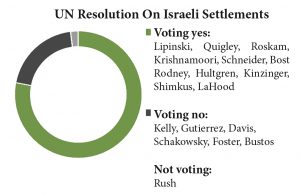 UN Resolution On Israeli Settlements: Voting 342 for and 80 against, the House on Jan. 5 adopted a non-binding measure (H Res 11) condemning a formal demand by the United Nations Security Council for Israel to stop building settlements in the West Bank and parts of Jerusalem. The U.N. resolution, which gained approval last month when the United States abstained from voting on it, said the expanded settlements undercut chances of Israel and the Palestinians reaching a two-state solution to their hostilities.
UN Resolution On Israeli Settlements: Voting 342 for and 80 against, the House on Jan. 5 adopted a non-binding measure (H Res 11) condemning a formal demand by the United Nations Security Council for Israel to stop building settlements in the West Bank and parts of Jerusalem. The U.N. resolution, which gained approval last month when the United States abstained from voting on it, said the expanded settlements undercut chances of Israel and the Palestinians reaching a two-state solution to their hostilities.
Elliot Engel, D-N.Y., said: “It is time to repair the damage done by this misguided hit job at the U.N. It is time to rebuild our partnership with Israel and reaffirm our commitment to her security.”
David Price, D-N.C., said the measure “includes reckless and divisive charges regarding the recent…Security Council resolution, designed, it would appear, solely to embarrass the (Obama) administration.”
A yes vote was to condemn the U.N. resolution and support the Israeli settlements policy.
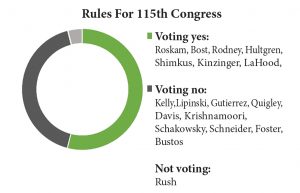 Rules For 115th Congress: Voting 234 for and 190 against, the House on Jan. 3 adopted standing rules that have governed House procedures since the First Federal Congress of 1789-1791. The package (H Res 5) also includes rules drafted by the Republican majority specifically for the two-year span of the 115th Congress.
Rules For 115th Congress: Voting 234 for and 190 against, the House on Jan. 3 adopted standing rules that have governed House procedures since the First Federal Congress of 1789-1791. The package (H Res 5) also includes rules drafted by the Republican majority specifically for the two-year span of the 115th Congress.
In part, the new GOP rules would allow the planned repeal of the Affordable Care Act to increase annual deficits; change budget rules to expedite federal land conveyances to private parties; allow appropriations bills to be used to reduce the federal workforce and civil servants’ salaries; expand staff authority to question private citizens under oath without lawmakers being present for the deposition, and authorize fines on members using electronic devices to stream coverage of certain floor activity to the public (next issue).
Dan Newhouse, R-Wash., said the rules “demonstrate that House Republicans are committed to…conservative, free-market principles to grow our economy, restore prosperity and increase opportunities for all Americans.”
Robert Scott, D-Va., said: “Obamacare actually saves money,” but Republicans “will allow for the repeal without offsetting the cost of that repeal, costing billions, possibly hundreds of billions, to the deficit.”
A yes vote was to adopt the GOP-drafted rules package.
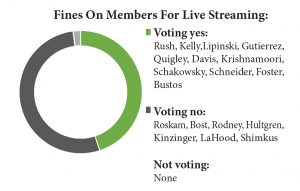 Fines On Members For Live Streaming: Voting 193 for and 236 against, the House on Jan. 3 refused to strip H Res 5 (above) of its language authorizing fines on members who use electronic devices to post photos or live video of actions on the House floor when the House is not formally in session. Under this rule, the Sergeant at Arms could dock members’ pay by $500 for the first offense and $2,500 for each additional offense. Critics called this a gag rule designed to shield public actions from the public, while defenders said it would protect everybody’s speech by preserving House decorum.
Fines On Members For Live Streaming: Voting 193 for and 236 against, the House on Jan. 3 refused to strip H Res 5 (above) of its language authorizing fines on members who use electronic devices to post photos or live video of actions on the House floor when the House is not formally in session. Under this rule, the Sergeant at Arms could dock members’ pay by $500 for the first offense and $2,500 for each additional offense. Critics called this a gag rule designed to shield public actions from the public, while defenders said it would protect everybody’s speech by preserving House decorum.
John Lewis, D-Ga., said: “No Congress, nobody, no committee, has the power to tell us that we cannot stand up, speak up and speak truth to power. We have a right to dissent. We have a right to protest for what is right.”
Bradley Byrne, R-Ala., said: “Without effective sanctions, we cannot have free speech on this floor. Every member of this House should be concerned about maintaining the decorum of the House.”
A yes vote was to prohibit fines on members using smart phones to “live stream” activity on the House floor.
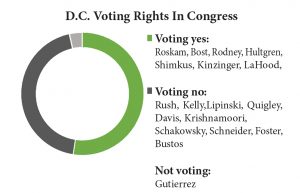 D.C. Voting Rights In Congress: Voting 228 for and 184 against, the House on Jan. 3 blocked a bid by Democrats to establish limited voting rights on the House floor for the delegates who represent the District of Columbia, American Samoa, Guam, the Northern Mariana Islands, Puerto Rico and the Virgin Islands. At present, the six delegates can only vote on bills in standing committees. This measure called for a study into possibly allowing them to also vote in the Committee of the Whole (where the House conducts most of its legislative business) but not on final actions on bills. The last time delegates had Committee of the Whole voting privileges was in the 111th Congress (2009-2010).
D.C. Voting Rights In Congress: Voting 228 for and 184 against, the House on Jan. 3 blocked a bid by Democrats to establish limited voting rights on the House floor for the delegates who represent the District of Columbia, American Samoa, Guam, the Northern Mariana Islands, Puerto Rico and the Virgin Islands. At present, the six delegates can only vote on bills in standing committees. This measure called for a study into possibly allowing them to also vote in the Committee of the Whole (where the House conducts most of its legislative business) but not on final actions on bills. The last time delegates had Committee of the Whole voting privileges was in the 111th Congress (2009-2010).
A yes vote opposed the Democratic measure.
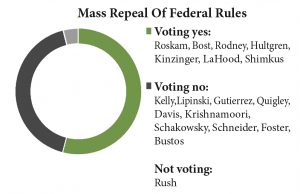 Mass Repeal Of Federal Rules: Voting 238 for and 184 against, the House on Jan. 4 passed a GOP-sponsored bill (HR 21) that would enable Congress, by adopting a single resolution, to kill all regulations issued by the administration since May 2016. This would override an existing requirement that any repeal of federal rules must occur on a one-by-one basis rather than en bloc. Backers said the bill would prevent the Obama administration from issuing “midnight regulations” as it leaves town, while critics called it a backdoor attempt to kill health, safety and environmental regulations that Republicans find objectionable.
Mass Repeal Of Federal Rules: Voting 238 for and 184 against, the House on Jan. 4 passed a GOP-sponsored bill (HR 21) that would enable Congress, by adopting a single resolution, to kill all regulations issued by the administration since May 2016. This would override an existing requirement that any repeal of federal rules must occur on a one-by-one basis rather than en bloc. Backers said the bill would prevent the Obama administration from issuing “midnight regulations” as it leaves town, while critics called it a backdoor attempt to kill health, safety and environmental regulations that Republicans find objectionable.
Darrell Issa, R-Calif., said “only the worst of the worst (regulations) are going to be stayed through this (bill) and then re-evaluated by the new administration.”
Jerrold Nadler, D-N.Y., said the bill furthers the Republican Party’s “all-out assault…on the ability to issue regulations that protect public health and safety.”
A yes vote was to send the bill to the Senate, where it could face a Democratic filibuster.
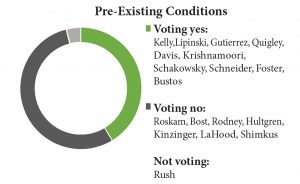 Pre-Existing Conditions: Voting 183 for and 236 against, the House on Jan. 4 defeated an attempt by Democrats to exempt from HR 21 (above) any new regulations that would prevent insurance companies from denying health coverage on the basis of pre-existing conditions.
Pre-Existing Conditions: Voting 183 for and 236 against, the House on Jan. 4 defeated an attempt by Democrats to exempt from HR 21 (above) any new regulations that would prevent insurance companies from denying health coverage on the basis of pre-existing conditions.
Kathy Castor, D-Fla., said the measure would preserve “the vital consumer protection that prohibits insurance companies from denying coverage because someone has a pre-existing condition like cancer, asthma or diabetes.”
Darrell Issa, R-Calif., said none of the regulations potentially targeted by this bill concern pre-existing conditions.
A yes vote was to adopt the Democratic motion to protect healthcare rules.
Senate
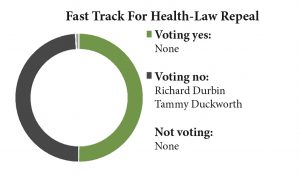 Fast Track For Health-Law Repeal: Voting 51 for and 48 against, the Senate advanced a budget provision that establishes a simple-majority vote (rather than 60 votes) as the threshold for Senate passage of a bill repealing the Affordable Care Act. This would prevent Democrats from filibustering a repeal measure expected soon on the Senate floor. This vote occurred during debate on a congressional budget for fiscal 2017-2026 (S Con Res 3).
Fast Track For Health-Law Repeal: Voting 51 for and 48 against, the Senate advanced a budget provision that establishes a simple-majority vote (rather than 60 votes) as the threshold for Senate passage of a bill repealing the Affordable Care Act. This would prevent Democrats from filibustering a repeal measure expected soon on the Senate floor. This vote occurred during debate on a congressional budget for fiscal 2017-2026 (S Con Res 3).
Mike Enzi, R-Wyo., said: “Today, we take the first steps to repair the nation’s broken healthcare system, removing Washington from the equation and putting control back where it belongs: with patients, their families and their doctors.”
Richard Durbin, D-Ill., said: “The bottom line is that 29 million Americans now have health insurance because of the Affordable Care Act. We have the lowest rate of uninsured Americans in modern history, and now the Republicans want to repeal this.”
A yes vote backed fast-track “reconciliation” procedures for repealing the Affordable Care A







